Don't wanna be here? Send us removal request.
Text

I wanted to see this Jynx in Arcane part 2.
3 notes
·
View notes
Text
The wisdom of the aging devil
Funny that Aging Devil punishes humans with an ironic twist. People are afraid of getting older, time passing, lines appearing in their face? Aging Devil says "ok, how about you stay the same way forever instead, is that better?". Maybe this is because they themselves have come to understand that aging is the lesser evil. They have existed as unchanging, un-aging Devil but they don't want to do it anymore. Life can change for a human, but life for a devil is an unbreakable, eternal loop.
I think that Aging Devil believes that humans are ultimately mistaken to fear them and their punishment is a harsh lesson as to why.
30 notes
·
View notes
Text

#house of the dragon#hotd#hotd season 2#hotd season two#otto hightower#got#game of thrones#a song of ice and fire#asoiaf
358 notes
·
View notes
Text
Justice Devil
Ok, I'm calling bullshit on the gigantic caterpillar monster being the Justice Devil. The concept of justice is too thematically rich in this story to be embodied in a random big monster. For both Asa and Denji, the feeling of being deserving/undeserving of their circumstances is a central pillar to their psychological state.


For people who go through so much torment and misfortune, guilt can become attached to anything they value. No, I reckon that Justice Devil is still out there, and whatever form it takes, it's going to further push Asa and Denji's story forward.
18 notes
·
View notes
Text
Tears of the Kingdom thoughts
Ok here’s one I’m just going to do off the top of my head. I don’t really have any thematic or narrative analysis of this game, so this is just going to be about gameplay. I’m just coming to the end of the game and I have found that my enjoyment has faded dramatically over time. Some of the biggest problems in my opinion are:
1. The combat doesn’t have enough depth or reward to justify itself as the game progresses. Both parry and flurry rush are too powerful, making waiting and counterplay too productive. Similarly, the slo-mo you get from firing your bow mid-air is way too strong. It makes gaining some vertical distance the top strategy in almost every scenario and trivializes actually getting good at shooting the bow. Furthermore, there’s way too much menu selection and grinding/farming required for encounters. At a certain point in the late game, I fought a white Lynel. I countered his first hit and then hit him a bunch of times with the Master Sword. The beast took almost no damage and the sword broke. It was that moment that killed my desire to fight any tough enemies ever again. When I look to combat in previous Zelda games, like Skyward Sword or Twilight Princess, I see a nice clean test of ability, where the enemy is tailored to the particular stage of the player’s skill and gear. It’s also nice to fight a group of enemies without having to pause the action and scroll though menus a bunch of times. I recognize that this particular problem with ToTK’s combat is due to the open-ended gameplay and progression, but it’s a downside nonetheless.
2. The physics systems and Zonai abilities are great fun to use, but the game does not demand you diversify your tactics and solutions. The fan is the biggest culprit when it comes to optimizing exploration. Having access to convenient vertical movement allows the player to just skip over many of the challenges and atmosphere of traversing Hyrule. Because the fan is so good, even other methods of vertical movement, like balloons, DIY bridges and catapults are made irrelevant.
3. Puzzles can be solved creatively but very rarely do they require creativity, or test the player much at all. Completing shrines was an enjoyable experience for me but the vast majority felt like they ended before the truly got started. A fair few were so simple that they basically just introduced the player to a concept and made them execute it, no twist on the formula whatsoever. Dungeons too are pretty rough in this regard. They’re not so much one big puzzle space as just a compilation of a couple of shrine concepts bundled together. It was a disappointment considering how the “return” of dungeons were hyped up before the games release.
I have plenty of other gripes but I think I will leave it with these issues. The millions of people who have played this games have demonstrated all these fantastic and inventive methods of traversal, combat and puzzle solving. The problem is that these solutions never produce an advantage in time saved, effectiveness or reward. It’s always more productive to just exploit the games systems in a safe, predictable way. I understand for some people, going out of the way to be creative is a reward in itself. For me though, I need more than just creativity to be possible; I need it to be a necessity. For most of the game, it just isn’t.
A lot of these shortcoming stem from the fact that ToTK is an open game which prizes freedom above all else. The game isn’t uneven or poorly conceived; it’s that certain elements of the design are in contradiction to others. To me that’s fascinating, since it leaves no easy answers for fixes. I can think of plenty for issues like the bow bullet time, for example, but how can one gradually intensify and elaborate on puzzles or combat when the player can approach them in any order? Or just skip some entirely? I’m not sure. It’s clear to me that open world design is here to stay for Zelda, and I think that’s for the best. ToTK is still overall a good game and roaming around Hyrule is a massive highlight. I just hope the developers have a hard look at what can be improved and don’t get distracted by the massively positive reaction to the last two games. If there’s any team that can do that, it’s the Zelda team.
#the legend of zelda#zelda#legend of zelda#link#totk#totk thoughts#tears of the kingdom#meta#analysis#critique#nintendo#nintendo switch
7 notes
·
View notes
Text
Denji, The Door and The Dream
Lately, I’ve been thinking a lot about Denji’s journey in part 1 of Chainsaw Man, especially the symbolic meaning of the door. Makima spells out the literal secret that was hidden, but I feel that it goes deeper than just the death of Denji’s father. In Fire Punch, one of Fujimoto’s other works, the question of how the main protagonist can continue to live despite all he goes through is the central stake of the narrative. In Chainsaw Man, Denji is effectively immortal. As such, his central conflict is also how he can continue to live in the symbolic dimension, as his own person with his own dreams. Throughout the manga, Denji has a new life constructed for him, watches it be obliterated, then reforges himself anew. At the most fundamental level, this arc is propelled first by the opening of the door, and the nature of Deni's dreams.
Denji's dreams of simple comforts and security are quickly achieved when he's taken in by Makima to work with Public Safety. At a very early stage however, Denji finds the fulfillment waning and sets up a new dream to work towards; reaching second base.
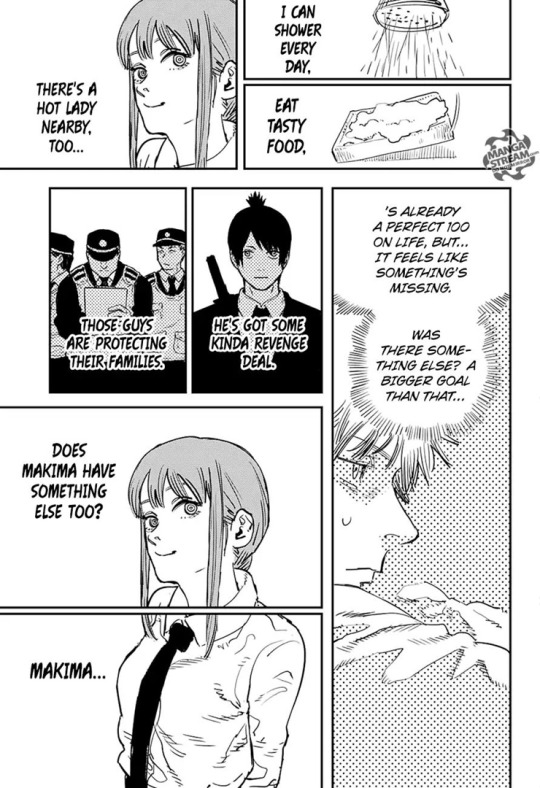
Just as before though, the experience of reaching his goal leaves a feeling of emptiness in it's wake.
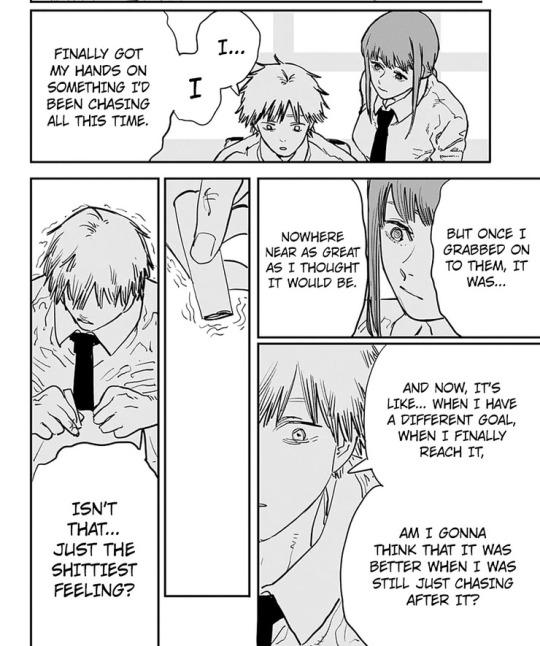
In response, Makima just sets out a new goal for Denji. An interrogation of what true fulfillment may mean for Denji is deferred for later.
Throughout his journey, Denji experiences the recurring dream of the door, the one that should never be opened.
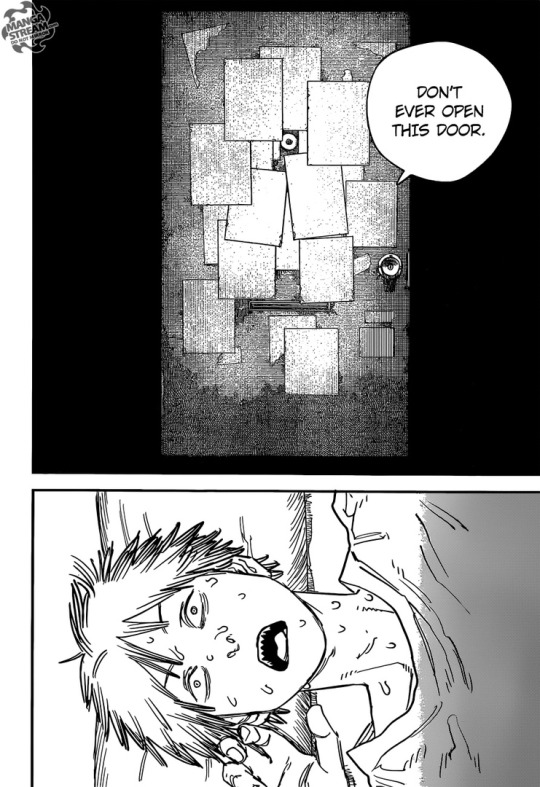
By the end of the International Assassins arc, he makes the resolution to leave the door closed, to let ignorance be bliss as Quanxi put it. Too many times already has Denji let down by the truth behind the curtain, such as with his relationship with Reze.

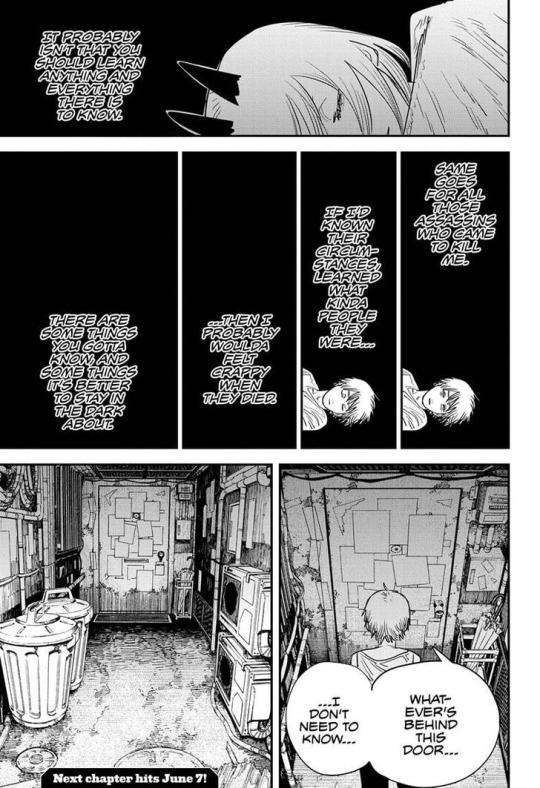
Makima, however, forces the door open by implicating Denji in the death of his new family, Aki and Power. It is revealed that Denji's locked away the memory of murdering his own father deep in his own subconscious as a way of protecting himself.
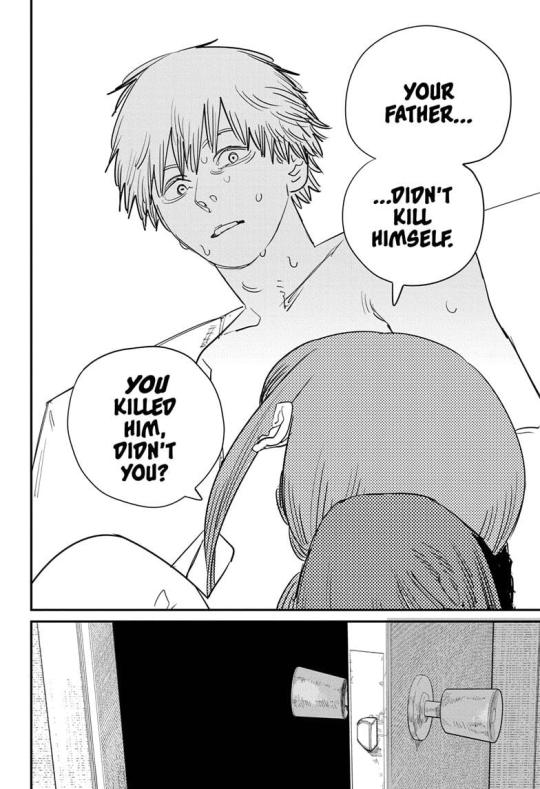
With that revelation, a long carried but never acknowledged fear is given voice by Makima; that it's wrong for Denji to dream at all, that he is undeserving of any good that may come to him.
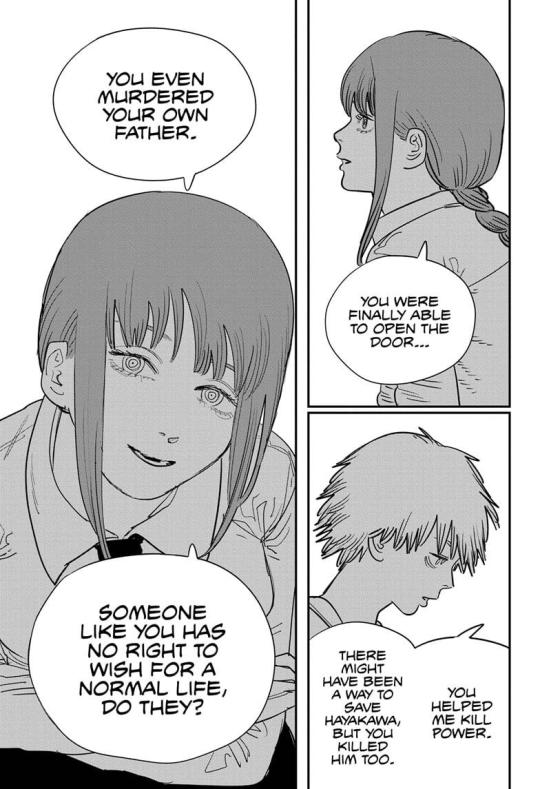
This the moment that utterly crushes Denji and it's represented symbolically by his child-self affirming it to Makima.
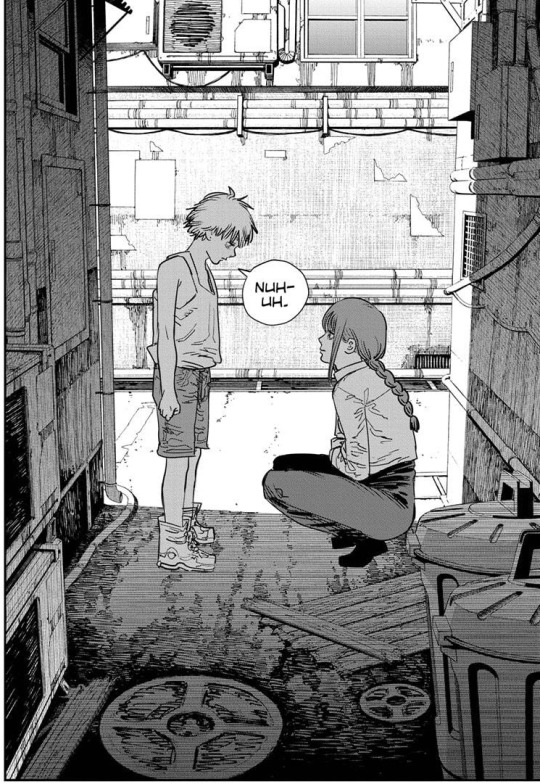
This image is illustrative of how Makima strives to reduce and pacify the people around her, but it also shows that the belief was born the day he murdered his father, and carried with him ever since. When Makima congratulates and calls him a good boy and congratulates him, Denji suddenly begins to cry.
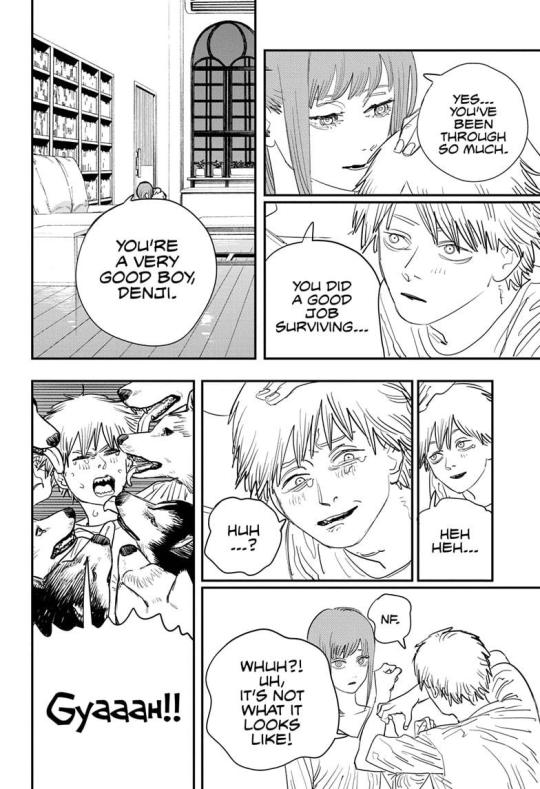
Hearing someone say to him hits so hard because he never believed it about himself.
Denji choses to keep living after Power sacrifices herself for him, but his dreams need a new direction. It's in Kishibe's underground safehouse where he is finally able to reflect. As it turns out, there had been a misunderstanding at the heart of Denji's dreams. When Makima thought of how to break Denji's contract with Pochita, she believed it was necessary to prevent him from having a "normal life". Denji too equates his dreams of a better life with the achievement of normalcy in chapter 1 and throughout the story.

Here is the crucial fact, however. Pochita never mentioned normalcy in his contract with Denji. He merely asked Denji to show him his dreams.
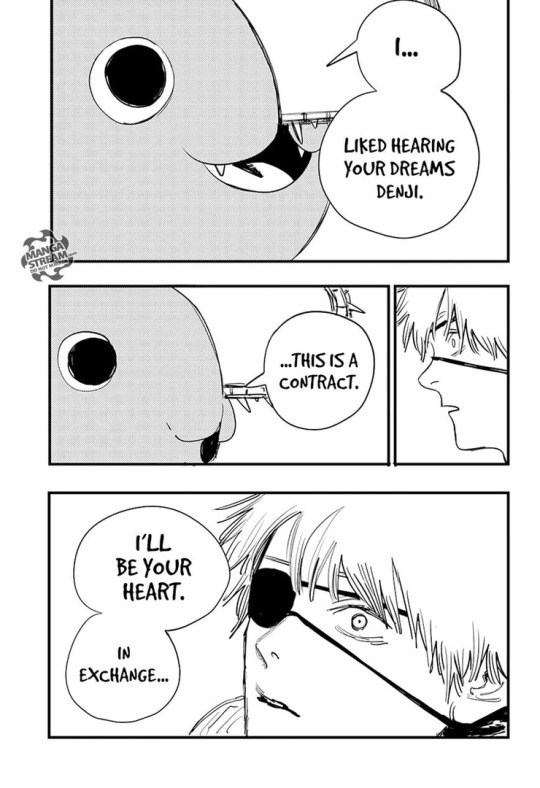
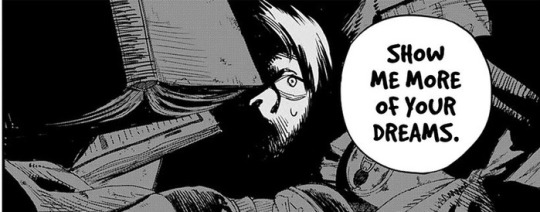
The word "show" is pivotal too, for Pochita does not say "achieve" or fulfill". Dreams of fullfillment and contentment are not measured by any real condition of normalcy, for one does not exist. As Makima said, Denji was happy enough in his routine with Pochita. Dreams have a life of their own and are constantly renewed and reformed. The joy is in dreaming and striving itself. That is the realization that Denji comes too when Kobeni asks him if he ever actually wanted to be normal.
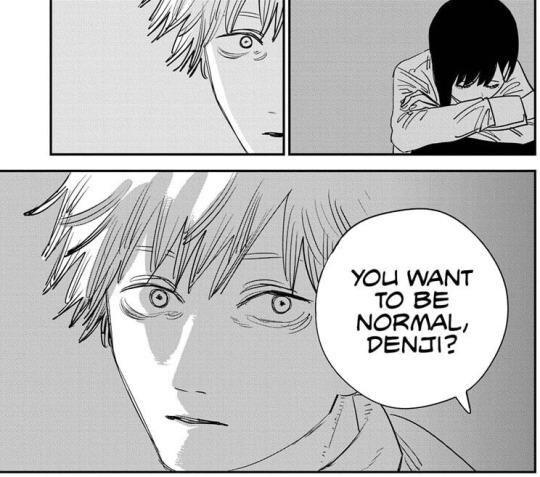
Normalcy is being controlled, being pushed around, being kept on a leash. The truth is he didn't want it then and doesn't want it now; he dreams of more. With this revelation, a new way to keep living presents itself to Denji. He shouts that he wants more, that he wants ten girlfriends.

His new goal may seem juvenile and petty, but it's not the goal itself which Denji is recommitted to. Instead, it is a synthesis of all Denji has learned thus far. He knows he is just a dog chasing cars, but through deliberate ignorance, he can choose to believe in the chase, to keep moving forward and sustain himself. To be Chainsaw Man for his own selfish desires. He's knows it's wrong and he knows he shouldn't, but for his own survival, he can push those feelings aside too. That's the place Denji ends part 1, and it will be interesting to where his dreams will carry him in part 2.
#chainsaw man#csm#makima#denji#denji hayakawa#pochita#chainsaw man part 1 spoilers#csm pt 1#meta#character analysis
28 notes
·
View notes
Text
Daemon and Viserys
The moment in episode 8 when Viserys drops his crown on his long walk to the Iron Throne only to look up and see Daemon by his side was one of my favourite moments of the whole season. It really hit me like nothing else had thus far and I think it’s because of the way that it both heals the rift between the brothers that was established in episode one, and serves as a powerful cumulative moment in each of their individual journeys.
Back during Daemon’s first banishment, Daemon hurled an accusation at Viserys that is very illuminating of Daemon’s motivations. It was that despite Viserys shuffling him around the small council and entertaining his excesses, Viserys had never fully embraced him as he should have, had never gave him his due as his brother.
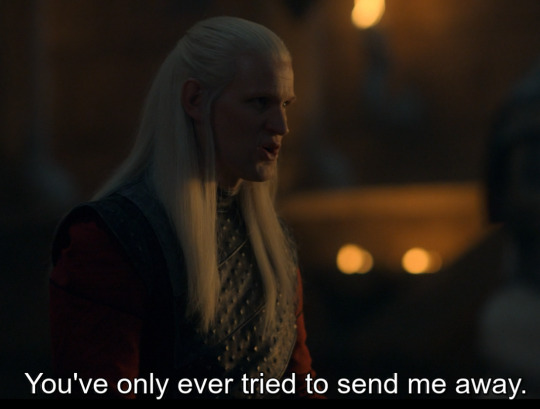
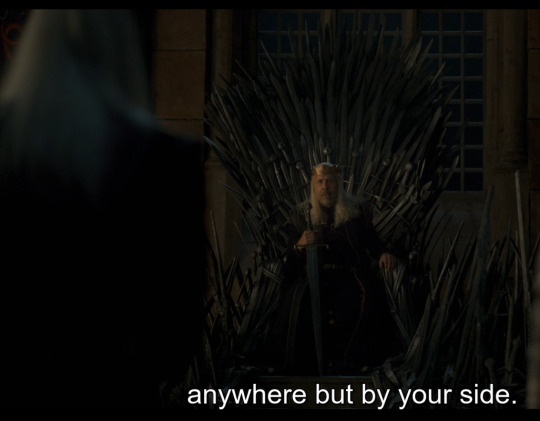
Daemon wants respect, but more important is his need to feel truly wanted. For Viserys to express a desire to have Daemon by his side. He’s scared that even though Viserys may love him, he could make do without him. Conquering The Stepstones by himself was a way to prove his usefulness to his brother on his own terms, but that reunion didn’t last. After another long period of no contact, Viserys once again invited Daemon home, with a position at his court if that is what Daemon’s station requires. For the same reason he chaffed under Viserys all those years ago, Daemon refused.

This hole in Daemon cannot be filled with token positions on Viserys’s council. He wants to be embraced, not coaxed and placated.
On the other hand, Viserys’s main struggle this season was against his own weakness, which Daemon keenly pinpointed during their argument. Viserys’s aversion to conflict allowed others to erode his authority and endanger his own interests. He saw decision making as sacrificing one thing for another, so would prefer to not draw the line at all.
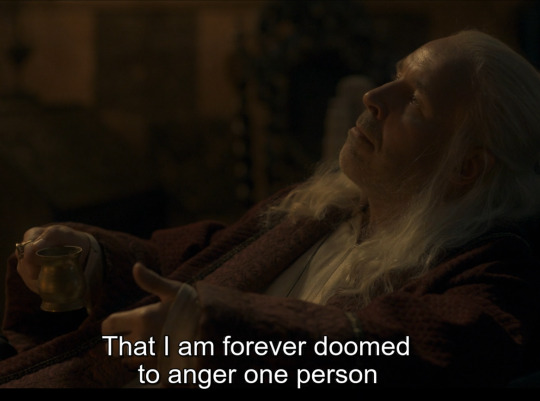
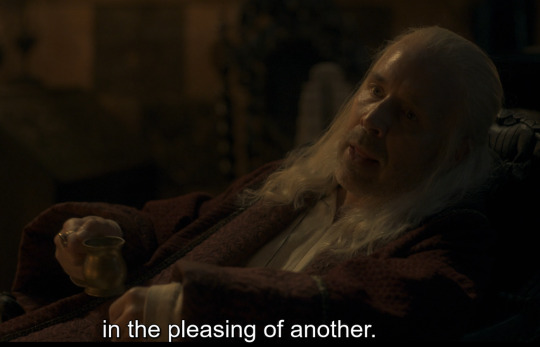
Viserys saw the lack of conflict in his reign as the reason he had never been tested, but it was actually evidence of his failure to set things straight and enforce his will. The test never ceased from the moment he named Rhaenyra heir.
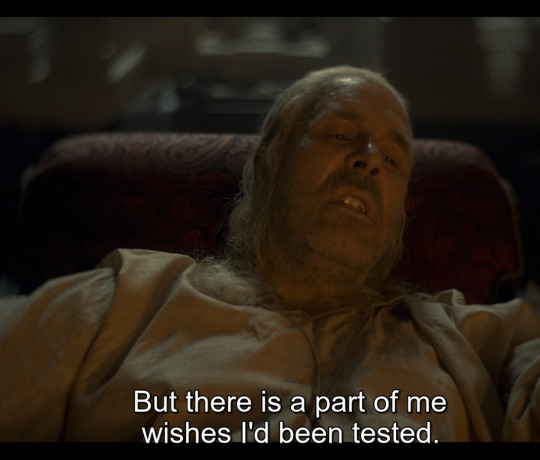
Both of these two currents came together in episode 8. Viserys, despite being at his lowest point physically, summoned the strength to walk to the throne room and sit the Iron Throne one last time. He refused assistance from the kingsguard because he understood the symbolic power of climbing the steps to the throne alone. When the crown drops from his head, however, Daemon is there to help. He encourages Viserys up the last few steps but supports him only lightly, because he now sees that Viserys has found the strength inside himself to be king.
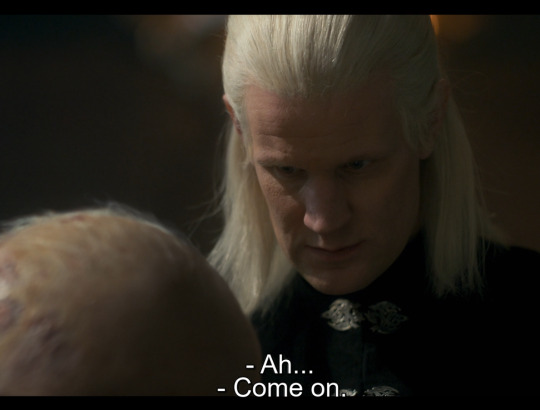
As for Daemon, he finally gets what he’s always wanted to; to walk by his brother’s side, to be leaned on, to be there when his brother needed him most.
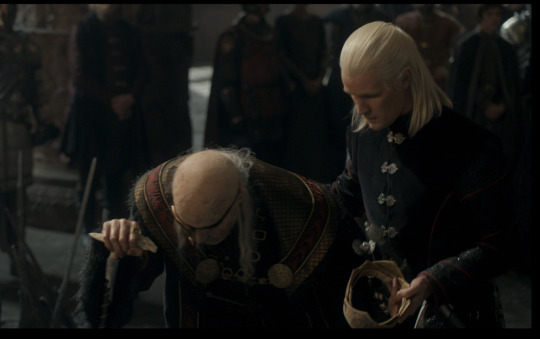
And Viserys accepted his help. It’s beautiful.
#house of the dragon#hotd#Daemon Targaryen#viserys targaryen#king viserys targaryen#rhaenyra#meta#character analysis#anlysis#game of thrones#a song of ice and fire
16 notes
·
View notes
Text
Otto and Mysaria
After seeing Otto collect information from the “White Worm” in episode 4, a detail from episode 2 became a lot more interesting. The small council receives Daemon’s wedding invite. Corlys asks who the Lady Mysaria is and the Grand Maester goes to answer, but Otto quickly interrupts to say that she is just a “whore”.

Otto doesn’t want people prying into her identity, and the reason for that is because she is already source for his information-gathering. Knowing that, a lot of questions arise over how much of this relationship Daemon knows, and how that information about the “heir for a day” incident landed with Otto.
26 notes
·
View notes
Text
Otto and Daemon
My favorite part of House of the Dragon’s first episode was the way that Otto Hightower and Daemon Targereyn both perfectly described themselves when trying to condemn the other.
“The Gods have yet to make a man who lacks the patience for absolute power”
“A second son who stands to inherit nothing he doesn’t seize for himself”
Even though they are two very different men, there seems to be a fair bit of projection when it comes to how they perceive each other’s intentions.
153 notes
·
View notes
Text
The Legend of Zelda: Majora’s Mask and its Unique Representation of Climate Disaster

“Each year, the season of harmony begins when the sun and moon are in alignment. Paying homage to the way that both nature and time are tirelessly in the process of progressing... The Carnival of Time is when the peoples of the four worlds celebrate that harmony and request fruitfulness for the year” – Anju’s Grandmother.
The Legend of Zelda: Majora’s Mask is a game about impending doom. This is fairly obvious to anyone who’s played the game, and even some of those who have not. What struck me while playing through the game for the first time, however, is the unexpected resonance the game has with the ongoing worldwide crisis of environmental destruction and climate change. Additionally, the unique 3-day time travelling structure creates a temporal relationship to disaster that speaks to our modern day experience of the Anthropocene. In this analysis, I’m going to investigate Majora’s Mask’s portrayal of the climate and disaster in depth and show how it relates to our experience of time.
The world of Majora’s Mask
The basic setup of Majora’s Mask is that Link arrives in the new land of Termina and is tasked with stopping the crafty Skull Kid from using the power of Majora’s Mask to bring down the moon on Clock Town and kill everyone in the land. The moon itself has a terrible grimace and hangs over Link’s head throughout the entire game; a perfect symbol of apocalyptic doom. To stop it, Link must gather four giants that live in each corner of the world to come and hold up the moon. The problem is that preparing everything cannot possibly be done in the three days before the moon’s impact, so Link uses his Ocarina to continually rewind time back to the start of the first day, only retaining certain items he’s collected and the new knowledge that he has discovered. By slowly accumulating what he needs, Link is able to bring all the giants together and stop the Skull Kid within the span of one cycle. On the fourth day, the Carnival of Time finally takes place in Clock Town.

It is during Link’s quest to find the four giants that the extent of Termina’s environmental collapse becomes apparent. To the south of Clock Town is the swamp, where the waters have become toxic and invasive species have proliferated. To the north, a terrible cold snap has hit Snowpeak Mountain, home of the Gorons, freezing many where they stand. To the west is the Great Bay, where the aquatic Zora people can no longer hatch their eggs in the ocean because of rising water temperatures. Finally, to the east is Ikana valley, the desert graveyard of an old kingdom. The river that was once the lifeblood of the valley is now but a scar of cracked mud. Moving through these environments in 2021 is eerie, perhaps more so that what was intended by the developers. The Zora’s becoming incapable of reproducing themselves in their natural environment is chilling in the context of current global marine extinction. Ikana valley on the other hand, with its ruins of a once proud civilization, feels like a reflection of our future.
The Real World Experience of Climate Change
Climate change is a unique form of disaster. With a disaster like a bush fire, there is a lead-up, the violent event, then the aftermath. The heating of our atmosphere and oceans, however, blurs these distinctions. If it began at any point, climate change would have begun during the Industrial revolution. That point is far, far before the living memory of anyone alive today, and it moves further back in our shared history with every passing moment. As for climate change’s end, who knows? Living through it, we don’t experience a cause and effect, a beginning and an end; climate change is instead a crisis of the perpetual now.

The big apocalyptic moment where everyone can say ‘now THAT was what all of this was leading up to’ will never come. It’s just a part of everyday life. As a result, the global climate catastrophe is problem that is so big and all-encompassing that it can be difficult to hold all of it in one’s mind and harder to formulate a response. It’s a lead-up, an event, and an aftermath happening all at once, leaving us in a strange liminal space between it all.
Community and Tradition
Within Clock Town, Link comes face to face with a diverse range of reactions to impending doom. Some are like the Postman or the town builders, who stick to their routine because that’s all they have.

Even as the moon grows nearer, the bank clerk dismisses the coming apocalypse as mere rumour. Others like the Mayor of Clock Town can’t make a decision either way. As Cremia from Romani Ranch says, “that's how life goes, I guess”. No one better encapsulates the fatalism of Clock Town’s residents as carpenter Mutoh. After denying the disaster up until that point, Link finds him on the third day refusing to run and telling the moon “If you're gonna fall, then fall already!” Just like the four different environmental disasters, these attitudes hit differently in the context of global climate change.
By observing Termina as a whole, however, one starts to see a certain pattern emerge. In all corners of the land, one of the most damaging things about disaster is the way it disrupt the transmission of knowledge necessary to keep a culture thriving. Both Snowpeak and The Great Bay feature a heroic figure, Darmani and Mikau respectively, who tries to help their people but die with their will tragically unfulfilled. By healing their souls and using their masks to solve the crisis, Link steps into their social role and bridges the gap left by their absence. He acts as an agent of continuity for the community he’s helping, rather than being a purely foreign agent coming in to save the day. To this end, songs are of central importance to Link’s efforts. On Snowpeak Mountain, all of the Gorons are unsettled because the young child of the village elder misses his pops and won’t stop crying. It turns out the elder has been frozen solid outside so the village, so Link unthaws the him and is taught the first part of the lullaby the elder usually sings to his son.

When played to the kid, he remembers the rest of the lullaby and finally goes to sleep, giving the rest of the Gorons a little comfort in dark times. Similarly, the “New Wave Bossa Nova” that Link learns from Lulu’s tadpole-like children turns out to be the key to entering the Great Bay Temple and lifting the strange curse upon the ocean. Like with the Gorons, the special song was once sung to Lulu as a child, thus marking it a culturally-specific form of knowledge. Through its disruption, the community’s capacity to reproduce itself was damaged.
In Ikana Valley, we see the same phenomena but inverted. Undead Stalchildren roam the graveyard at night because guard duty was the last order given to them while they were alive. Link can choose to go and fight the giant, skeletal Captain Keeta, the Stalchildren’s superior.

If he’s successful, Keeta will finally accept the loss of his kingdom and instructs Link to go inform his men that “the war is over”. His final request before passing on is to ask Link if he can take leave. Link mercifully accepts. Rather than reintroducing traditional knowledge that has been disrupted by disaster, Link instead puts an end to an order that has been made redundant by the Kingdom’s demise. What you might call “living time”, the organic progression of knowledge, material and community, is thrown out of balance by climate disaster. In all three examples, what replaces it is “disaster time”, marked by discontinuity, rupture and stasis. Majora’s Mask makes this metaphorical distinction literal; the suffering of Termina’s people under environmental disaster is inseparable from the unnatural loop through which Link experiences it. The connection between climate change and our temporal experience is inseparable for us as well.
Conclusion
With all of this in mind, one question arises; what is Link’s greatest tool? The answer is memory. By remembering each previous loop, only Link is able to slowly bring everything he needs together to confront the Skull Kid and stop the moon. Of all the intelligence he gathers, some of the most useful is knowledge rooted in culture and tradition. As a fantasy story, The Legend of Zelda series often venerate tradition’s role in preserving harmony. When analyzing Majora’s Mask through an ecological lens, however, this isn’t necessarily what we must take away for own climate situation. Rather, what we can keep in mind is that climate change, no matter how big and nebulous, is ultimately a historically situated event. For a young person like myself, I’ve spent a big chunk of my life hearing the same reports on how bad things have gotten the same promises from politicians and the same obstacles rear the head again and again. The truth though is that before things began to spiral out of control, people all around the world had their ways of living sustainably with their environment. Many of them still do. What we can do is synthesize the old in order to make progress and to break out of the loop.
#the legend of zelda#majora's mask#zelda#link#loz#The Legend of Zelda: Majora's Mask#analysis#meta#climate change#climate emergency#climate disaster#nintendo#games#videogames
40 notes
·
View notes
Note
Do you see any validity in the theory that Deku is descended from AfO? You've brought it up as a possibility, how likely do you think it is? Personally, I think it doesn't add anything to the story that it might be true based just on evidence and the Chekov's Gun effect.
I don't think it's too likely anymore. Now that AfO and Deku are more directly connected, you would think that we would get some clues to that effect. There's also the fact that just being the "descendant" doesn't really have much impact on the story. Deku being AfO's son would be a bombshell, but then we would have to make sense of Inko being in a relationship/sleeping with the most terrible villain of the quirk era lmao.
Instead, Hori might just be going for a parallel of Deku and AfO's origin, in how they both aspired to embody the heroism/villainy they absorbed in their childhood. Tsuyu's line about living the fantasy of a comic book hero in most recent chapter is a pretty direct reference.
3 notes
·
View notes
Text
Hero Society’s Pyrrhic Victory: how Destro’s ideology is more influential than ever
I gotta admit I was a little disappointed at how hard the PLF were destroyed in the war arc. ReDestro, Geten and Trumpet were all captured too late to be broken back out of Tartarus and most of the lieutenants didn’t really get a chance to shine. The exception is Skeptic, who actually had made quite an impact through his collaboration with Dabi. Regardless, the PLF’s central organization got rocked. Their plan and grand strategy, however, is surprisingly healthy. Before the war, hawks basically figures out their strategy for bringing about a meta liberation revolution.

Even with the PLF dismantled, the first step of their plan actually became a reality. Shigaraki dusting a massive chunk of a city and Giga rampaging across the country has pushed the heroes working capacity past their breaking point and perfectly demonstrated that the civilian populace cannot rely on the heroes to protect them. The PLF and the Hearts and Minds party are now unable to capitalize on the unrest, but it seems that the liberation ideology has taken root in the population enough to stir change by itself. As Redestro says, the seeds have been sown.

Even with 16,000 or so members captured, we must remember that ReDestro claimed he had over 100,000 soldiers in the group. It should be noted that even these low-ranking members of the PLF are just as ideologically motivated as the top brass, angry with current state of affairs in hero society.


Additionally, those 132 members that escaped from the mansion include lieutenants that can become new local leaders of the movement.

Furthermore, It’s clear that a progression has taken place in regards to liberation ideology among common people. The first time we someone act in accordance with Destro’s belief, It’s just some crazy dude with a grievance against his workplace.

The thing about Horikoshi’s worldbuilding is that he often uses one-off civilian characters to depict the “direction” popular opinion and society is heading in. From this guy, we can see that before the Deika city clash, Destro’s ideology was still fringe. After Deika, however, we can see a shift in people’s ideas about liberation and using quirks for self-defense. Using his power of video editing and propaganda, Skeptic turns the battle between the MLA and the LOV into a story of virtuous community defense.


The PLF also got an unexpected media boost by Hawks. Even though he was only doing it to appear devoted to the cause and get secret intelligence out to the top-ranking heroes, his public endorsements of Destro’s ideas made an impact.

Thus, in Endeavor’s battle with Starservant in the Endeavor internship arc, we can see that random civilians are more willing to fight to protect themselves and others.

At this point however, there was still an underlying respect for the heroes; the office worker was only suggesting to hold off Starservant until the heroes arrive, not deal with it entirely by themselves. That is, until the heroes dropped the ball entirely. As hawks said back in the pro-hero arc, the most people are afraid, the more open they are to new ideologies contrary to the status quo.

In the latest chapter, we can see that an ordinary person was about to jump in and fight a gang by himself, with the use of a Detnerat-style support item. Not only that, but he is explicitly anti-hero. Right in front of our eyes, we’re seeing Japan slip back into the era of fear and pessimism that All Might grew up in.

In an unexpected visual parallel, we can see the discontent of the liberation soldier hawks spoke too reflected now in a big chunk of the faces in the crowd. Not once in the series have ordinary people looked so unhappy to see a hero.

In conclusion, despite the fact that the PLF’s ability to conduct large scale operations has been neutralized and its leadership has been decapitated, the public’s receptiveness to their ideas has never been higher. It’s clear that this plot thread will only become more important in new era to come.
#my hero academia#boku no hero academia#mha#bnha#Meta Liberation Army#paranormal liberation front#destro#redestro#re-destro#analysis#hawks#keigo tamaki#All Might#yagi toshinori#skeptic#best jeanist
70 notes
·
View notes
Text
AfO’s true villainy
All the villains busting out in the most recent chapter got me thinking about how their personality traits factor in to how evil they are perceived. Muscular and Moonfish probably have the simplest connection of the named villains we’ve seen in Tartarus. They simply have a strong a desire to kill, and are therefore seen as very evil. Other characters, like Stain and Shigaraki, also have violent tendencies, but their characters are made more complex by their codes (Stain) or their relationships with others (Shigaraki). One villain, however, is both definitively evil while not being solely driven by bloodlust. That character is All For One. Now don’t get me wrong, AfO has performed countless acts of unjustified violence, and it’s obvious that he often takes pleasure in it. Nonetheless, it seems to me that the core of AfO’s villainy is in fact that he is a narcissist. Not only is it prominent in nearly every interaction he has in the manga, but it goes far in explaining the central contradiction of his character.
First of all, I’d like to just give a rundown of what I mean when I say that AfO is narcissist. The most obvious tell is his obsessive fixation with becoming a “demon king”. His sole goal in life is to live out a fantasy where everything in the world is just a backdrop to his story. It’s hard to overstate how self-absorbed that is. Even so, many other villains (and heroes) have goals they pursue obsessively and selfishly. What makes AfO different is the lengths he goes to prop up his own ego and manipulate those around him.
For example, even when he was still aiming to make Shigaraki his successor, he refers to him as “the next me”.

Furthermore, perhaps as an act of projection, he claims that Shigaraki was born twisted.
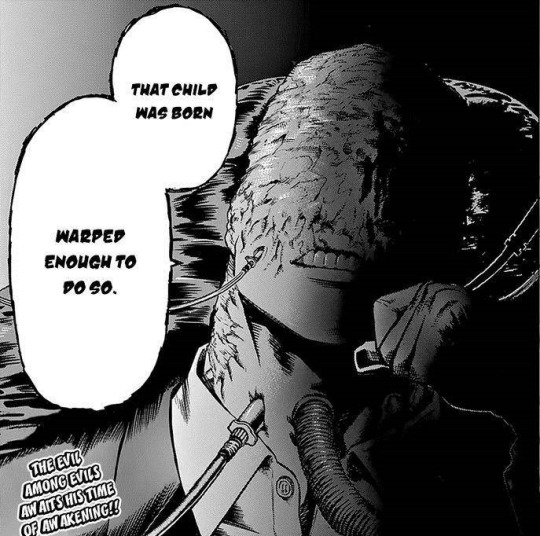
What’s Interesting though is the fact that AfO constantly feels the need to portray himself as generous and understanding. Even though he has the power to rule with sheer force, he also wields his image as weapon. This behavior is clearly shown in his conversations with his little brother.


AfO refuses to listen to his brothers arguments and instead projects and deflects, trying to paint his brother as self-absorbed and uncompromising. When he goes to force his will on his younger brother, AfO once again tries frame the act as a selfless “gift” that the one should be glad to accept.

Even when he has his brother locked away like a prisoner, AfO acts as if he has nothing to do with it and projects concern.

This pattern of behavior is repeated with Shigaraki, perhaps because Shigaraki is proxy for his younger brother in AfO’s mind. When he takes over Shigaraki’s body, he simply cannot admit that this was his goal and he desired it. He instead manipulates Shigaraki by claiming that the body possession was done simply out of concern for Shigaraki’s welfare.

Shigaraki calls him out on his deceptions later, but AfO turns it around and makes it sound as if Shigaraki asked for all of this and that he should in fact feels grateful towards his master. In his argument between them, AfO constructs a narrative for himself where Shigaraki is the instigator of the conflict and All For One ‘s good deeds are unfairly unappreciated.

All for One’s violent acts, and therefore his villainy itself, are all a direct result of his need to protect his dreams of power and his self-image as magnanimous benefactor. With this is mind, we can take a look at the longstanding contradiction between AfO’s plan to make Shigaraki his successor and his attempt to usurp Shigaraki for his own ends.

In a way, I feel like it’s quite simple. Just as AfO lies to everyone around him, he also lies to himself. His inability to self-reflect means that he can switch between mindsets like it’s nothing. It’s probably true that early in the manga, AfO planned to have Shigaraki succeed him and felt pride in his disciple. The satisfying feeling of being the supportive mentor, however, could never compare to the chance of taking back the throne himself. This is why AfO is the ultimate evil of this story; in his private universe, there will only ever be room for himself.
#all for one#shigaraki tomura#bnha#mha#mha manga#bnha manga#my hero academia#boku no hero academia#Tenko Shimura#villain#league of villains#analysis
63 notes
·
View notes
Text
His father’s house
So it seems that by the end of the the most recent chapter, Deku has intuitively grasped the consequences of Shigaraki falling between the gaps and into the clutches of AfO. On one hand, the last panel of the destroyed cityscape is a simple reminder of all the destruction of this arc. On the other, it’s an important symbolic reminder of the root of Shigaraki’s rage.
First of all, the cityscape is featured in Shigaraki’s “Plus Ultra” speech. It should be noted that Deku, unlike Endeavor, actually seems to listen to what Shigaraki is saying.

Just as important is the word “reject”. It’s not the same, but it’s ancestry can be traced back to this motif, the most fundamental building block of Shigaraki’s origin; the feeling of being “Denied” by his father’s house.

Shigaraki destroys the house, his family and the itch that plagued him, but tragically only for a short time. Being shunned by the people on the street, like how his plight was ignored by the rest of his family, transferred the feelings he about his father’s house to the entire world.

This all comes full circle with the final panel of the latest chapter. Despite all of Shigaraki’s crimes, Deku understands that somewhere down the line, someone was failed. They were never saved at all. That’s why Deku’s final line is accompanied by obliterated cityscape that denied Shigaraki.

#izuku midoriya#DekU#Tenko Shimura#shigaraki tomura#Shigaraki#my hero academia#boku no hero academia#mha manga#bnha manga#symbolism#analysis#ch 295
342 notes
·
View notes
Text
Bakugo’s quirk awakening
Along with his new hero name “Dynamight”, we also got to see a new form of Bakugo’s explosions this chapter.

Rather than just a new technique, it seems to be that this upgrade is a emergent expression of Bakugo’s mentality and approach to using his quirk altogether. We actually have some precedent for this happening.

In the MLA arc, Toga unlocked a totally new aspect of her quirk and Shigaraki unleashed the power which he had unconsciously held back for years.

The reason this is possible is because quirks are inextricably linked to one’s character. Asa result, intense emotion or dramatic shifts in personality can change the quirk in turn.
So, In Bakugo’s case, we can see that his quirk has responded to his moment of “moving without thinking” when he rushed to save Deku. That pure drive to save comes easy to Deku and All Might, but Bakugo has had to come a long way and do a lot soul-searching to achieve it.


So, while Bakugo used to only embody the “win to save” half of All Might’s ethos, he now “saves to win”. Just as example, here’s what his explosions typically look like:

They’re much rougher and smokier, almost dirty. The new ones flash brightly and cleanly, demonstrating his newfound clarity of purpose.
I think it’s really cool to see the “quirk evolution’ concept come back and for it to happen to Bakugo just when he reveals his new hero name. The All Might reference in “Dynamight” is so much better now he’s acting like a true successor himself. Hopefully his explosions in future arcs will continue appearing like sparkly ones.
#mha#mha manga#bnha#bnha manga#ch 293#bakugo#katsuki bakugo#kachan#dynamight#All Might#deku#izuku midoriya#yagi toshinori#my hero academia#boku no hero academia#quirks#meta
16 notes
·
View notes











